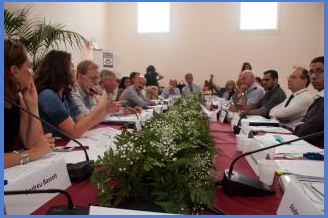Dates: 17 – 18 July 2012
Region: Palermo, Italy
 The Anna Lindh Foundation (ALF) in cooperation with the Ethnobarometer organised in Palermo, Italy, a two-day workshop on the role of media in presenting information related to the Arab uprising and economic crisis and the impact this has on mutual perceptions between the people of the region and in particular towards Muslim populations in Europe.
The Anna Lindh Foundation (ALF) in cooperation with the Ethnobarometer organised in Palermo, Italy, a two-day workshop on the role of media in presenting information related to the Arab uprising and economic crisis and the impact this has on mutual perceptions between the people of the region and in particular towards Muslim populations in Europe.

The event gathered around 25 participants including journalists, civil society representatives and representatives of Muslim communities in Europe as well as experts on issues related to media, migration and perceptions with the purpose of discussing if and how perceptions towards Arab and Muslim populations in Europe have changed after the Arab Spring and as a consequence of the economic crisis.
One of the issues highlighted by the speakers is the lack of cultural diversity in the European newsrooms that has to be addressed; quotas should be established to allow the entrance of journalists with immigrant backgrounds in newspapers.
Cooperation and exchange between European and Arab journalists is very important for in-depth understanding of facts and professionalisation of journalists, reports ALF.
Another issue is the importance of choice of terminology to be used when referring to the current political trends in the Arab world such as the term “Islamist” which is usually associated to terrorism or threat, other terms which need to be re-considered are “political Islam” and “Arab Spring”, reports ALF.
Associate Arab migrant populations in Europe with their religious belonging (in Germany for example the evolution of the concepts related to Turkish communities goes from Foreigner to Turkish to Muslim) is another trend that needs to be addressed and avoided. Speakers also stressed the importance of the concept of ‘citizenship’ which is still poorly adopted when speaking about migrant communities in Europe and to include Islamophobia among the acts of discrimination to be punished by law.
Muslim populations in Europe have actively participated in the changes happening in the Arab countries and this has had a particular strong impact on the self-image of second generation of immigrants by creating a sense of pride and enticing the sense of political participation. Furthermore, from the Arab uprising, new media actors appear on the scene and the “citizen journalist” plays an important role as source of information for mainstream media journalists and the community at large.
In light of this, we can say that new social media network and traditional journalism are complementary and equally necessary, the first to spread information to large audiences and put people in contact, the latter to provide reliable information in depth.